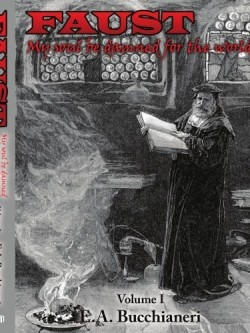Faust
My Soul be Damned for the World, Volume One
“Faust the notorious reprobate who willingly forfeited his immortal soul to the devil in exchange for the fleeting illusory pleasures of the world as depicted and recounted in famous works of art literature drama and music did not originate as the imaginary brainchild of a literary genius” E.A. Bucchianeri writes. “A historical figure named ‘Faust’ did exist but with the passage of time this individual faded into semi-obscurity gradually becoming immortalized as a mythical character….” So begins the first volume of Bucchianeri’s incisive study of one of Western culture’s iconic literary figures.
The author brings to life the man Georg Helmstetter (Georgius “Sabellicus” Faustus) upon whom the legends are based tracing his activities from his birth in 1466 or ’67 through his death in 1539 or ‘40. The subject is first encountered as a student at Heidelberg University using the name “Johannes Faust” or “Faustus.” An enigmatic elusive and dark figure whose activities could easily have put him in danger of torture and death by the Inquisition Faust (Helmstetter) nevertheless left a trail through personal writings public records and in stories of his words and deeds as told by acquaintances. Records of his activities can be found in the writings of Martin Luther and his associates including Faust’s damning statement that the devil was his “brother-in-law.”
The very name “Faust” meaning either “fortunate” or “auspicious” (from the Latin “Faustus”) or “fist” (from the German) was an adopted name; humanists in Helmstetter’s day were accustomed to taking on Latinized pseudonyms. Bucchianeri suggests that the choice of such an appellation would have been “advantageous as a method of self-promotion”; the assumed identity had the effect of creating an “artificial family” or lineage linking Faust to the occultists of the past and to a reputation that would “reflect his occult knowledge and academic learning.”
Bucchianeri posits that the Faust legend may have served as a warning to Christians against involvement in the black arts and as a veiled introduction to new scientific theories considered blasphemous by the Church; her study of Christopher Marlowe’s Faust drama first performed in 1604 demonstrates his use of it to express his dissatisfaction with the religious politics of the Elizabethan Age. The volume concludes with discussions of how the Faustian legend was demoted to “semi-farcical entertainment” in puppet plays which were particularly popular with the German lower class and of the lost drama by a “prominent leader of the new Age of Enlightenment and a founding father of German national drama” Gotthold Ephraim Lessing (German b. 1725). Lessing’s work twenty years in the making was lost supposedly en route to its intended publisher but remaining fragments offer a glimpse into how the Age of Enlightenment transformed the legend into a tale of how the quest for knowledge rather than leading to damnation might lead to true salvation and freedom from the constraints imposed by fear of religious reprisal.
Bucchianeri’s meticulous research provides the background for Johann Wolfgang von Goethe’s masterful Faust discussed in volume two; scholars and historians will appreciate the depth and breadth of this well-written concise and thoughtful volume and its ample footnotes and bibliography will facilitate further independent research.
Disclosure: This article is not an endorsement, but a review. The publisher of this book provided free copies of the book and paid a small fee to have their book reviewed by a professional reviewer. Foreword Reviews and Clarion Reviews make no guarantee that the publisher will receive a positive review. Foreword Magazine, Inc. is disclosing this in accordance with the Federal Trade Commission’s 16 CFR, Part 255.

